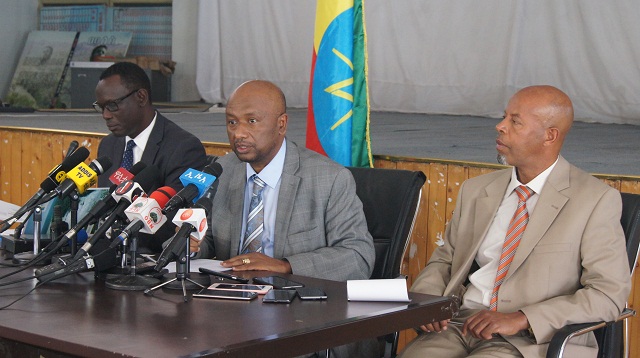
Addis Ababa, Ethiopia | NBI | The Nile Basin Initiative (NBI), in partnership with the government of Ethiopia, will on Thursday host the Nile Day 2018 celebrations in Addis Ababa. February 22 is marked in the Nile Basin region as it was on that date in 2010 that the countries in the region agreed to work to enhance the potential of the River Nile.
“It is on this date that for the first time, all independent, sovereign riparian countries of the Nile committed themselves to work together and harness the potentials of the shared river to promote cooperative sustainable socio-economic development of their countries”, said Dr. Seleshi Bekele, Chairman of the Nile Council of Ministers (Nile-COM), who is also Ethiopia’s Minister of Water, Irrigation and Electricity.
Addressing media representatives from the 10 Nile Basin Initiative Member States, Dr. Seleshi Bekele said the celebrations whose theme is, The Nile: Shared River, Collective Action will be attended by at least 500 Nile Basin citizens and friends of the Nile.
These will include Ministers in charge of Water Affairs in the Nile Basin countries (Nile Council of Ministers); representatives from NBI Member States embassies and officials from Ministries whose activities touch on the management and development of the shared water resources, namely Water, Environment, Energy, Agriculture, Foreign Affairs, Finance. Others are Members of Parliament, Development Partners, Researchers, Academia, Civil society, Youth, Media, and school children.
Ethiopia is hosting the Regional Nile Day event for the third time. The celebrations will take place at the United Nations Economic Commission for Africa (UNECA) Conference Centre.
A number of activities have been lined up including a brass band-led procession starting from Meskel Square to the United Nations Economic Commission for Africa, an exhibition by various partners showcasing achievements and on-going works in water and water related activities, speeches by different dignitaries, as well as a performance by children and by Addis Ababa University Theatre School and Cultural Centre.
The highlight of the celebrations will be a symposium on the topic; ‘Towards effective Nile cooperation: Exploring options for enhanced political engagement’. Participants will deliberate on the current challenges of the Nile Basin Initiative and chart the way forward to a solution through innovative engagement of the Member States.
The annual Nile Day event provides an opportunity to increase awareness of the importance of basin-wide Nile Cooperation in jointly taking good care of and utilizing the shared Nile Basin water and related resources for win-win benefits. This is in addition to enhancing awareness about the consequences of non-cooperation as well as the challenges of Nile cooperation. On a lighter note, the day serves to expose participants to the rich and varied cultures, which exist within the Nile Basin.
River Nile
Traversing about 6,695 kilometers, the Nile is one of world’s longest rivers, feeding millions and giving birth to entire civilizations. The river is a major source of water for the Nile Basin countries.
Water, energy and food are inextricably linked and are essential for human well-being, poverty reduction and sustainable development.
The close interrelationships amongst these resources therefore call for our balancing of the act of exploitation to ensure sustainability for our future generations, for we are, but only stewards of these resources.
Projections in the Nile Basin region indicate that demand for energy, food and freshwater, will increase significantly over the next decades under the pressure of population growth and mobility, economic development, regional trade, urbanization and climate change among others. Agriculture in the Nile Basin consumes more water than any other sector.
At the same time, water is needed for energy generation and transmission, particularly for hydro power, which is the preferred source of energy for various reasons; key among them the low production cost, which makes power affordable to the urban and rural poor. On the other hand, energy is needed to produce, transport, treat and distribute water; the more energy we need, the more water we use, and vice versa.
 The Independent Uganda: You get the Truth we Pay the Price
The Independent Uganda: You get the Truth we Pay the Price





